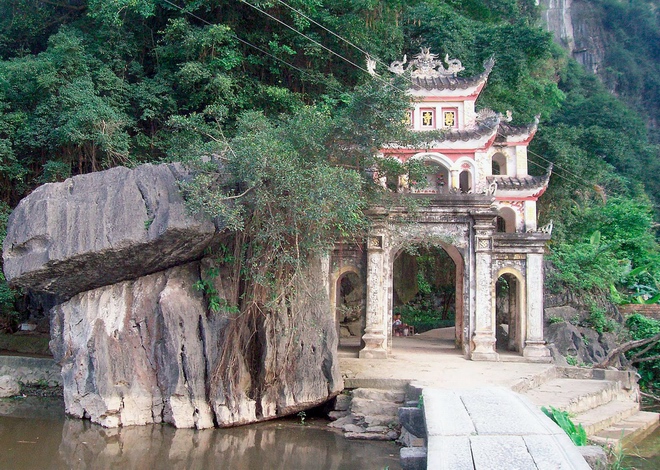|
The three old pagodas on
Bich Dong, a grotto located in the Ngu Hanh Son mountain
range, in Dam hamlet, Minh Hai commune, Hoa Lu district
is particularly interesting. A short boat trip will take
tourists to a beautiful landscape with canals meandering
between high rocks and grottoes.
In the 18th century King Tu Duc visited Bich Dong.
Charmed by the marvelous scenery offered by the
mountains, rivers and cliff top pagodas, the King
conferred on Bich Dong the title of the Second Most
Beautiful Grotto in Vietnam.
The number one grotto title belongs to Huong Tich Grotto
in Ha Tay, Hanoi.
Tam Coc-Bich Dong Tourist Area in Ninh Hai Commune, Hoa
Lu District in Ninh Binh Province is a very popular area
and in comparison with Tam Coc Grotto, Bich Dong is less
popular but it would be a mistake to miss out.
We were keen to visit Bich Dong but we were surprised
that there were no monks or Buddhist nuns near the
pagoda we were met instead by some local boat hirers
on Hoang Long River. Bich Dong Cave is surrounded by
Hoang Long River and features a lot of lotus which sets
the area into a romantic and peaceful space.
Along the path to the pagoda, we were amazed by a
limestone mountain ahead with a space for many green
trees below. On the road are many souvenir vendors
waiting for tourists curiosity and admiration and cash
of course.
Visiting Bich Dong Pagoda, you will have chance to learn
about the architecture style as well as the traditional
values, which are contained in each construction in the
complex. The first destination to be visited is the Ha
(Lower) Pagoda, which is situated right at the foot of
the mountain. The pagoda features special patterns of
roofs. The roofs curve like the tail of phoenix and the
remains of traditions and history can be seen on crags,
steles, and trees.
The Pagoda worships Tam Bao, Buddha and the three monks
Tri Kien, Tri The, Tri Tam who had great contribution
in constructing and upgrading this pagoda.
After visiting Ha Pagoda, you will reach Trung (Middle)
Pagoda. The path leading to this pagoda is covered by
the shade of huge trees. Trung Pagoda was constructed
according to a popular pagoda model. The main presbytery
is the Buddha altar with a big calligraphic character,
which has the inscription Linh Son Phat Hoi. On the
right hand side is a path leading to the Toi Grotto (the
Dark Grotto). Moving through the 20 steps, tourists will
see a copper bell and a bridge where the victims of
injustice ask for justice.
It is said that such people who were unjustly treated
ring the bell three times, then they will be relieved of
their pain. In the French colonial period, this was a
place where weapons were produced for Vietnamese
patriots.
The stalactites in the Dark Grotto, under the invisible
hand of nature, form magical shapes among the gloomy
light. The strange and interesting shapes there have
become part of folklore due to the imaginations of local
people. The Dark Grotto worships the Buddha and the Mau
Thuong Ngan with stalactites shaped like a whale and a
turtles shell.
Upon getting out of the Dark Grotto, take 30 more steps
and tourists will reach the Thuong (Upper) Pagoda (it is
also referred to as the East Pagoda since it faces the
east). This is the smallest-scale pagoda among the three
pagodas mentioned here since it only worships Phat Ba
Quan Am. The temples of the God of Mountain and of Land
are located at the two sides of the pagoda. From there,
you will have a wonderful view of the beautiful
landscape, peaceful villages, the beauty of the mountain
and forest that nature has blessed the land of Ninh Binh.
The location for this pagoda was chosen in 1428 after
two monks were charmed by the view of the river and the
mountains. Later, King Le Canh Hung wrote a poem in
honor of the beautiful pagoda and landscape.

 More temples & pagodas More temples & pagodas
|